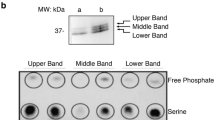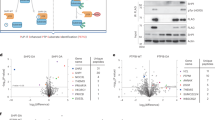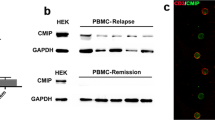Abstract
Cbl-b, a mammalian homolog of Cbl, consists of an N-terminal region (Cbl-b-N) highly homologous to oncogenic v-Cbl, a Ring finger, and a C-terminal region containing multiple proline-rich stretches and potential tyrosine phosphorylation sites. In the present study, we demonstrate that upon engagement of the T cell receptor (TCR), endogenous Cbl-b becomes rapidly tyrosine-phosphorylated. In heterogeneous COS-1 cells, Cbl-b was phosphorylated on tyrosine residues by both Syk- (Syk/Zap-70) and Src- (Fyn/Lck) family kinases, with Syk kinase inducing the most prominent effect. Syk associates and phosphorylates Cbl-b in Jurkat T cells. A Tyr-316 Cbl-binding site in Syk was required for the association with and for the maximal tyrosine phosphorylation of Cbl-b. Mutation at a loss-of-function site (Gly-298) in Cbl-b-N disrupts its interaction with Syk. Cbl-b constitutively binds Grb2 and becomes associated with Crk-L upon TCR stimulation. The Grb2- and the Crk-L-binding regions were mapped to the C-terminus of Cbl-b. The Crk-L-binding sites were further determined to be Y655DVP and Y709KIP, with the latter being the primary binding site. Taken together, these results implicate that Cbl-b is involved in TCR-mediated intracellular signaling pathways.
This is a preview of subscription content, access via your institution
Access options
Subscribe to this journal
Receive 50 print issues and online access
$259.00 per year
only $5.18 per issue
Buy this article
- Purchase on Springer Link
- Instant access to full article PDF
Prices may be subject to local taxes which are calculated during checkout







Similar content being viewed by others
References
Andoniou CE, Thien CB and Langdon WY. . 1996 Oncogene 12: 1981–1989.
Blake TJ, Shapiro M, Morse HCd and Langdon WY. . 1991 Oncogene 6: 653–657.
Bonnefoy BN, Liu Y-C, von WM, Sung A, Elly C, Mustelin T, Yoshida H, Ishizaka K and Altman A. . 1995 Proc. Natl. Acad. Sci. USA 92: 10142–10146.
Boussiotis VA, Freeman GJ, Berezovskaya A, Barber DL and Nadler LM. . 1997 Science 278: 124–128.
Bustelo XR, Crespo P, Lopez BM, Gutkind JS and Barbacid M. . 1997 Oncogene 15: 2511–2520.
Deckert M, Elly C, Altman A and Liu Y-C. . 1998 J. Biol. Chem. 273: 8867–8874.
Donovan JA, Ota Y, Langdon WY and Samelson LE. . 1996 J. Biol. Chem. 271: 26369–26374.
Donovan JA, Wange RL, Langdon WY and Samelson LE. . 1994 J. Biol. Chem. 269: 22921–22924.
Feshchenko EA, Langdon WY and Tsygankov AY. . 1998 J. Biol. Chem. 273: 8323–8331.
Fournel M, Davidson D, Weil R and Veillette A. . 1996 J. Exp. Med. 183: 301–306.
Keane MM, Rivero Lezcano OM, Mitchell JA, Robbins KC and Lipkowitz S. . 1995 Oncogene 10: 2367–2377.
Kong G, Dalton M, Wardenburg JB, Straus D, Kurosaki T and Chan A. . 1996 Mol. Cell. Biol. 16: 5026–5035.
Langdon WY, Hartley JW, Klinken SP, Ruscetti SK and Morse HCd. . 1989 Proc. Natl. Acad. Sci. USA 86: 1168–1172.
Latour S, Chow L and Veillette A. . 1996 J. Biol. Chem. 271: 22782–22790.
Lavagna-Sevenier C, Marhetto S, Birnbaum D and Rosnet O. . 1998 J. Biol. Chem. 273: 14962–14967.
Liu Y-C and Altman A. . 1998 Cell Signaling 10: 377–385.
Liu Y-C, Elly C, Langdon WY and Altman A. . 1997a J. Biol. Chem. 272: 168–173.
Liu Y-C, Liu Y, Elly C, Yoshida H, Lipkowitz S and Altman A. . 1997b J. Biol. Chem. 272: 9979–9985.
Liu Y-C, Elly C, Yoshida H, Bonnefoy-Berard N and Altman A. . 1996 J. Biol. Chem. 271: 14591–14595.
Lupher ML, Songyang Z, Shoelson SE, Cantley LC and Band H. . 1997 J. Biol. Chem. 272: 33140–33144.
Lupher MLJ, Reedquist KA, Miyake S, Langdon WY and Band H. . 1996 J. Biol. Chem. 271: 24063–24068.
Marengere L, Mirtsos C, Kozieradzki I, Veillette A, Mak T and Penninger J. . 1997 J. Immunol. 159: 70–76.
Murphy MA, Schnall RG, Venter DJ, Barnett L, Bertoncello I, Thien CB, Landon W and Bowtell D. . 1998 Mol. Cell. Biol. 18: 4872–4882.
Ota Y, Beitz LO, Scharenberg AM, Donovan JA, Kinet JP and Samelson LE. . 1996 J. Exp. Med. 184: 1713–1723.
Ota Y and Samelson LE. . 1997 Science 276: 418–420.
Reedquist KA, Fukazawa T, Panchamoorthy G, Langdon WY, Shoelson SE, Druker BJ and Band H. . 1996 J. Biol. Chem. 271: 8435–8442.
Rellahan BL, Graham LJ, Stoica B, DeBell KE and Bonvini E. . 1997 J. Biol. Chem. 272: 30806–30811.
Tanaka S, Ouchi T and Hanafusa H. . 1997 Proc. Natl. Acad. Sci. USA 94: 2356–2361.
Wange RL and Samelson LE. . 1996 Immunity 5: 197–205.
Weiss A and Littman DR. . 1994 Cell 76: 263–274.
Williams BL, Schreiber KL, Zhang W, Wange RL, Samelson LE, Leibson PJ and Abraham RT. . 1998 Mol. Cell. Biol. 18: 1388–1399.
Zhang Z, Elly C, Altman A and Liu Y-C. . 1998 Submitted for publication.
Zhao Q and Weiss A. . 1996 Mol. Cell. Biol. 16: 6765–6774.
Author information
Authors and Affiliations
Rights and permissions
About this article
Cite this article
Elly, C., Witte, S., Zhang, Z. et al. Tyrosine phosphorylation and complex formation of Cbl-b upon T cell receptor stimulation. Oncogene 18, 1147–1156 (1999). https://doi.org/10.1038/sj.onc.1202411
Received:
Revised:
Accepted:
Published:
Issue Date:
DOI: https://doi.org/10.1038/sj.onc.1202411
Keywords
This article is cited by
-
Umbilical mesenchymal stem cell-derived exosomes facilitate spinal cord functional recovery through the miR-199a-3p/145-5p-mediated NGF/TrkA signaling pathway in rats
Stem Cell Research & Therapy (2021)
-
Accessory proteins of the RAS-MAPK pathway: moving from the side line to the front line
Communications Biology (2021)
-
Cbl-b in T-cell activation
Seminars in Immunopathology (2010)
-
Syk
AfCS-Nature Molecule Pages (2007)
-
Molecular mechanisms of CD4+ T-cell anergy
Nature Reviews Immunology (2007)



